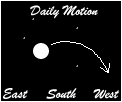
The Moon's daily motion is- eastward relative to the horizon.
- westward relative to the horizon.
- eastward among the background stars.
- westward among the background stars.
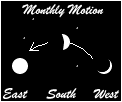
The Moon's monthly motion is- eastward relative to the horizon.
- westward relative to the horizon.
- eastward among the background stars.
- westward among the background stars.
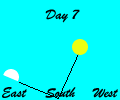
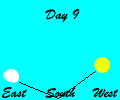
Due to its monthly motion, the Moon rises, transits, and sets- earlier each day.
- later each day.
- the same time each day.
- An eclipse of the Sun can only occur at what phase?
- New
- First Quarter
- Full
- Last Quarter
- An eclipse of the Moon can only occur at what phase?
- New
- First Quarter
- Full
- Last Quarter
- At what phase is the Moon visible all night, from sundown to sunup?
- New
- First Quarter
- Full
- All phases are visible all night.
- Around what phase would it be best to observe faint sky objects all night long without interference from moonlight?
- New
- First Quarter
- Full
- There is no time when the moon doesn't appear at night.
- If New Moon occurs on October 1, around what date will Full Moon occur?
- October 8
- October 15
- October 21
- October 28
- If Last Quarter occurs on June 14, the Moon will be at what phase around June 22?
- New
- Full
- First Quarter
- Waning Crescent
- If First Quarter occurs on May 7, the Moon will be at what phase around May 22?
- New
- Last Quarter
- First Quarter
- Waning Crescent
- If Full Moon occurs on January 14, the Moon will be at what phase around February 12?
- New
- Full Moon
- First Quarter
- Waning Crescent
- Looking at your calendar, you discover that today the Moon is at First Quarter. At sunset, where should you look for the Moon?
- high in the south
- toward the southwest
- rising in the east
- not up yet
- Looking at your calendar, you find out when Last Quarter will occur. When will it rise?
- sunrise
- sunset
- midday
- midnight
- It is midnight. Your friend reports that the Moon is high in the south. Without looking at the sky, you tell your friend that is a
- Waning Gibbous Moon.
- Waxing Crescent Moon.
- Waning Crescent Moon.
- Full Moon.
- It is midnight. Your friend reports that the Moon is low in the southwest. Without looking at the sky, you tell your friend that is a
- Waning Gibbous Moon.
- Waxing Crescent Moon.
- Waning Crescent Moon.
- Waxing Gibbous Moon.
- It is sunset. Your friend reports that the Moon is low in the southwest. Without looking at the sky, you tell your friend that is a
- Waning Gibbous Moon.
- Waxing Crescent Moon.
- Waning Crescent Moon.
- Waxing Gibbous Moon.
- Why don't eclipses occur every month?
- The moon revolves around the earth every 29.5 days.
- The relative angle between the moon and the sun cause it to appear in different phases.
- They do, that's what causes the phases of the moon.
- The moon's orbit is tilted with respect to the ecliptic.
- How often can we expect an eclipse of the Moon?
- every month
- every year
- twice a month
- twice a year
- A solar eclipse occured in February. When will the next solar eclipse occur?
- March of the same year.
- March of the next year.
- August of the same year.
- Eclipses can not be predicted this closely.
- A solar eclipse occurs. When will the next lunar eclipse occur?
- Two weeks later (or two weeks earlier).
- One month later (or one month earlier).
- One year later.
- Eclipses can not be predicted this closely.
- You experience a total lunar eclipse. Which statement is true?
- You are in the moon's penumbra.
- You are in the moon's umbra.
- The moon is in the earth's penumbra.
- The moon is in the earth's umbra.
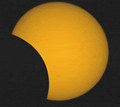
You experience a partial solar eclipse. Which statement is true?- You are in the moon's penumbra.
- You are in the moon's umbra.
- The moon is in the earth's penumbra.
- The moon is in the earth's umbra.
- You experience a partial lunar eclipse. Which statement is true?
- You are in the moon's penumbra.
- You are in the moon's umbra.
- The moon is in the earth's penumbra.
- The moon is in the earth's umbra.
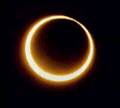
You experience an annular solar eclipse. Which statement is true?- The moon is in the earth's umbra.
- The moon is in the earth's penumbra.
- You are in the moon's umbra.
- You are in the moon's penumbra.
- How often can we expect an eclipse of the Sun?
- every month
- every year
- twice a month
- twice a year
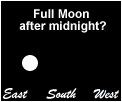
Will the Full Moon be found low in the southeast just after midnight?- Yes
- No
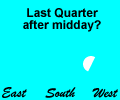
Can the Last Quarter Moon be found low in the southwest just after midday?- Yes
- No
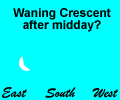
Can the Waning Crescent Moon be found low in the southeast just after midday?- Yes
- No
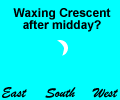
Can the Waxing Crescent Moon be found high in the south just after midday?- Yes
- No
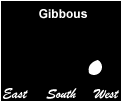
What time will the Waxing Gibbous Moon be seen low in the southwest?- midday
- midnight
- sunset
- sunrise
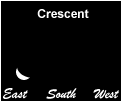
What time will the Waning Crescent Moon be seen low in the southeast?- midday
- midnight
- sunset
- sunrise
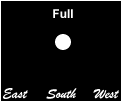
What time will the Full Moon be seen high in the south?- midday
- midnight
- sunset
- sunrise
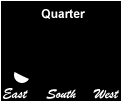
What time will the Waning Quarter Moon be seen low in the southeast?- after midday and before sunset
- after midnight and before sunrise
- after sunset and before midnight
- after sunrise and before midday
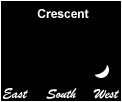
What time will the Waxing Crescent Moon be seen low in the southwest?- midday
- midnight
- sunset
- sunrise

What is the type of eclipse shown here?- Total Solar Eclipse
- Partial Solar Eclipse
- Annular Eclipse
- Lunar Eclipse

What is the type of eclipse shown here?- Total Solar Eclipse
- Partial Solar Eclipse
- Annular Eclipse
- Lunar Eclipse

What is the type of eclipse shown here?- Total Solar Eclipse
- Partial Solar Eclipse
- Annular Eclipse
- Lunar Eclipse